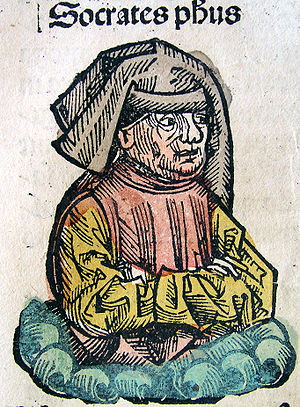 Poor Josephus. He is made to bear such a burden of evidence for the sake of Jesus. Socrates’ burden on the other hand is very light. People who knew Socrates wrote about him and we can read their accounts today. Some of these people tell us they were his students and devoted followers. Another was a playwright who irreverently mocked Socrates as someone whose head was always “in the clouds”. None of this leaves us with absolutely ironclad certainty that such a figure was historical but it does give us reasonable confidence. Without the writings of followers of Socrates we would never be sure if Socrates was a fictional character. Without the mockery of Aristophanes we would have more reason to wonder if there was a real person behind the name Plato selected as a literary master-voice through whom to express his own thoughts. Even so, a few have voiced the possibility that Socrates was not historical. But most of us have been satisfied to think of him as a real figure who instigated controversy in Athenian society and won a devoted following of students.
Poor Josephus. He is made to bear such a burden of evidence for the sake of Jesus. Socrates’ burden on the other hand is very light. People who knew Socrates wrote about him and we can read their accounts today. Some of these people tell us they were his students and devoted followers. Another was a playwright who irreverently mocked Socrates as someone whose head was always “in the clouds”. None of this leaves us with absolutely ironclad certainty that such a figure was historical but it does give us reasonable confidence. Without the writings of followers of Socrates we would never be sure if Socrates was a fictional character. Without the mockery of Aristophanes we would have more reason to wonder if there was a real person behind the name Plato selected as a literary master-voice through whom to express his own thoughts. Even so, a few have voiced the possibility that Socrates was not historical. But most of us have been satisfied to think of him as a real figure who instigated controversy in Athenian society and won a devoted following of students.
Jesus, though, is known only from one source of tradition, Christianity itself, until we reach at the earliest the latter years of the first century (and even within that tradition itself there is not a single one who claims to have been an eyewitness of the Galilean healing-teacher. It is not insignificant that this same tradition, in all of its many variations, seeks to spread belief in this person. The very idea of the twelve disciples of Jesus is problematic for several reasons. (The links are to earlier discussions of the evidence for them.)
So it is very important for some people to hang on tightly to the passages in Josephus that mention Jesus. Josephus, even though he wrote near the end of the century, a good 60 years after Jesus was supposed to have died, is the only first-century account independent of the Christian tradition and so the only non-Christian witness to the historicity of Jesus within a long generation of his death. One scholar has even gone on record as saying that because of Josephus the evidence for the existence for Jesus is comparable to that for Socrates! Now that is a desperate claim. Nothing about Josephus comes close to matching multiple eye-witness sources. Continue reading “Socrates, Jesus and the broken reed of Josephus”

